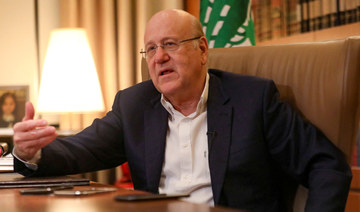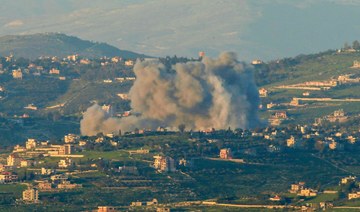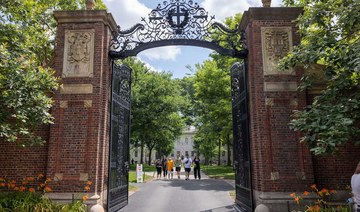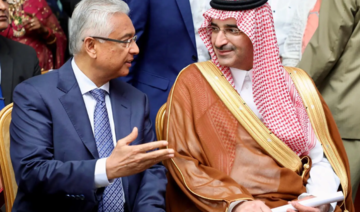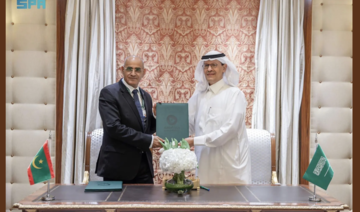MARJAYOUN, Lebanon: An escalation of fighting on Lebanon’s southern border would further strain hospitals already struggling with a lack of money in a national financial crisis, the Middle East chief of The International Committee of the Red Cross said on Wednesday.
Lebanon’s heavily armed Hezbollah party has been exchanging fire with Israel across the border over the last five months in parallel with the Gaza war. More than 50 civilians have been killed in Israeli shelling on Lebanon, along with more than 200 Hezbollah fighters, according to medical and security sources.
Israel says about a dozen of its soldiers and half as many civilians have been killed in shelling from Lebanon into the north of the country.
Doctors in southern Lebanon have sounded the alarm, saying an influx of wounded has pushed the health sector to its limits.
Speaking to Reuters outside Lebanon’s Marjayoun Hospital near the border with Israel, Fabrizio Carboni said Lebanon did not have the needed resources to support its health facilities.
“Then you also have a lot of health personnel who left the country – so, yes, there is a concern,” he said.
“We know should something happen – and we hope the situation will not deteriorate – there will be a need for substantial medical support for the population in the south of Lebanon and all people affected by the conflict,” Carboni said.
Marjayoun Hospital has 14 emergency beds and struggles to operate because of a lack of staff and, crucially, fuel shortages, its director has told Reuters. It runs on its own electricity generators for 20 hours a day, paying up to $20,000 a month for the fuel.
Carboni urged warring parties on the Lebanon-Israel border to respect the protected status of medical staff and facilities, saying it was “very concerning, very worrying” to see cases of rescue workers being killed in shelling.
Seven rescue workers and paramedics have been killed in Israeli shelling over the last five months, according to Lebanon’s health ministry.
Red Cross ‘concerned’ for south Lebanon’s hospitals in case of escalation
https://arab.news/98ap9
Red Cross ‘concerned’ for south Lebanon’s hospitals in case of escalation
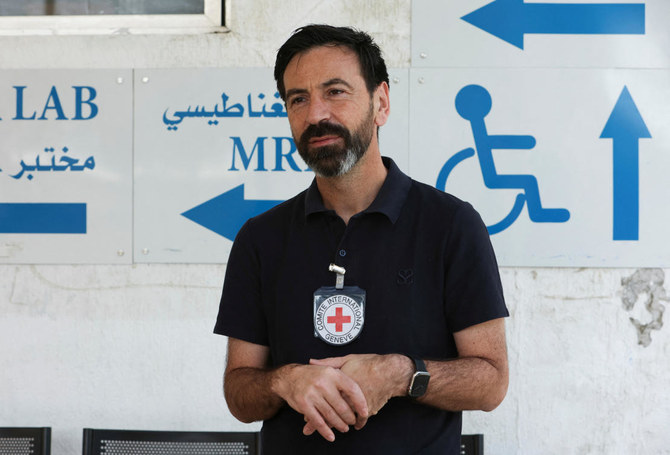
- Doctors in southern Lebanon have sounded the alarm, saying an influx of wounded has pushed the health sector to its limits
- Fabrizio Carboni said Lebanon did not have the needed resources to support its health facilities
Gulf Creatives Conference goes ahead despite nearby protest encampment

- Conference included 24 discussion sessions and five workshops covering topics such as public policy, innovation strategies, and the future of healthcare
- KFSH&RC CEO Dr. Majid Ibrahim Al-Fayyadh: The Saudi leadership has a clear vision for KFSH&RC, which was crowned by royal order to transform it into an independent institution of a private, nonprofit nature
CAMBRIDGE: The second edition of the Gulf Creatives Conference took place at Harvard University at the weekend, despite pro-Palestine protests on the campus.
“Amid the rising tensions on US college campuses, we believe firmly in the power of creativity and the arts in healing wounds and bridging divides,” Abdulla Almarzooqi, chairperson of the organization’s UAE Committee and a graduate student at Harvard, told Arab News in an interview.
The event attracted over 1,000 attendees and more than 170 speakers, among whom was Gulf Co-operation Council Secretary-General Jasem Al-Budaiwi. He took to the stage to address Gulf students and outline the region’s vision to lessen reliance on oil revenues by embracing diverse sectoral reforms.
“The strategic location, coupled with robust infrastructure, paves the way for the council member states to attract international partnerships that support their long-term development goals,” Al-Budaiwi said.
He added: “This dynamic approach is vital for sustaining economic growth and ensuring the resilience of Gulf economies in the face of global economic fluctuations and regional challenges.”
He also praised students for hosting such an event at one of the world’s most prestigious universities.
The conference included 24 discussion sessions and five workshops covering topics such as public policy, innovation strategies, and the future of healthcare.
Among the main speakers on healthcare was Dr. Majid Ibrahim Al-Fayyadh, CEO of the King Faisal Specialist Hospital and Research Center, who spoke of the emergence of a leading healthcare sector in the region after a decades-long transformation plan.
“The Saudi leadership has a clear vision for KFSH&RC, which was crowned by royal order to transform it into an independent institution of a private, nonprofit nature,” he said.
The transformation includes enhancing existing services and exploring new medical trends to improve health and well-being, he added.
Other panelists included Maryam Bin Theneya, second deputy speaker at the Federal National Council of the UAE, Bader Al-Attar of the Kuwait Petroleum Corporation, and Saudi Media Company’s Khalid Al-Khudair.
UAE, Mauritius sign MoU to boost energy cooperation

- Two sides will exchange expertise and information on emerging technologies, best practices and knowledge-sharing
DUBAI: The Emirati Ministry of Energy and Infrastructure and the Mauritian Ministry of Energy and Public Utilities inked a memorandum of understanding on Monday aimed at bolstering collaboration across water, energy and sanitation sectors, Emirates News Agency reported.
The agreement outlines a broad spectrum of cooperation, encompassing energy, renewable energy, hydrogen and its derivatives, energy efficiency, liquefied natural gas and water management.
Also under the agreement, cooperation will also take place in the water efficiency, desalination, digital technology applications, wastewater treatment and sanitation sectors.
Under the MoU, the two sides will exchange expertise and information on emerging technologies, best practices and knowledge-sharing.
They will also explore joint research and development initiatives and implement projects using public-private partnership and independent power producer models.
The agreement also facilitates joint visits, meetings and technical workshops, while encouraging bilateral investment in relevant sectors.
“This MoU cements the longstanding relations between the UAE and Mauritius and serves their shared commitment to sustainable development and environmental protection. The UAE follows a collaborative approach to meet the targets of the UAE Energy Strategy 2050, the National Hydrogen Strategy 2050, and the UAE Water Security Strategy 2036, which collectively contribute to the UAE’s net zero by 2050 target,” said Suhail bin Mohammed Al-Mazrouei, Emirati minister of energy and infrastructure.
Georges Pierre Lesjongard, Mauritian minister of energy and public utilities, thanked the UAE for the longstanding collaboration between the the emirates and Mauritius in various sectors.
He said that the cooperation played a pivotal role in advancing Mauritius’s goals outlined in its nationally determined contributions and in enhancing resilience against the impacts of climate change, particularly for Mauritius as a small island developing state.
Doctors treat Sharjah school teacher with rare nerve disease

DUBAI: Doctors in a Sharjah hospital helped a 46-year-old resident undergo treatment for a debilitating nerve disease that prevented her from walking.
Annie Cherian, a school teacher from India and living in Sharjah, experienced weakness in her limbs six months ago and her condition quickly worsened, making daily life tasks like brushing her hair or even walking increasingly difficult.
On April 3 Cherian sought help from doctors at Aster Hospitals in Sharjah and within two days received a CIDP diagnosis, a condition that affects approximately 1-2 people in 100,000 annually according to the CIDP Foundation International.
CIDP, or Chronic Inflammatory Demyelinating Polyneuropathy, is a rare autoimmune nerve disease that attacks the covering of the nerve cells and leads to loss of physical strength and sensation in the arms and legs. It can be caused by a virus or infection that enters the body.
Usually CIDP is treated with steroids, but as Cherian is also a diabetic, this option was not viable as it might worsen her diabetes, explained Dr. Rajesh Chaudhary, specialist neurologist at Aster Hospital Sharjah.
With the help of Chaudhary and his medical team, Cherian underwent an intravenous treatment which lasted five days.
The treatment involved introducing antibodies through the vein, which helps existing antibodies in the body to strengthen and fight off infections and diseases, Chaudhary explained.
“Without proper treatment, a patient’s quality of life becomes very poor and they struggle to do mundane everyday tasks,” said Chaudhary.
Other symptoms of CIDP include problems walking, lack of strength, tingling and pain in the limbs, he said.
Cherian responded well to the treatment and regained strength in her limbs, and is now able to perform everyday tasks unassisted.
Chaudhary said Cherian is expected to lead a normal life after the treatment and will most likely not experience weakness or fatigue in her limbs again.
“I am so grateful for the medical team who helped me recover remarkably and restore my strength, but also made me aware of autoimmune disease’s impact and the importance of timely medical intervention,” said Cherian.
Israeli forces push into Gaza from north and south

- Some of the most intense fighting for weeks now taking place on both the northern and southern edges of Gaza
- Hundreds of thousands of Palestinians again take flight and aid groups warn humanitarian crisis could worsen
CAIRO: Israeli forces pushed deep into the ruins of Gaza’s northern edge on Monday to recapture an area where they had claimed to have defeated Hamas months ago, while at the opposite end of the enclave tanks and troops pushed across a highway into Rafah.
With some of the most intense fighting for weeks now taking place on both the northern and southern edges of Gaza, hundreds of thousands of Palestinians have again taken flight, and aid groups warn that a humanitarian crisis could sharply worsen.
Israel described its latest return to the north, where it pulled out most of its troops five months ago, as part of a “mop-up” stage of the war to prevent fighters from returning, and said such operations had always been part of its plan. Palestinians say the need to keep fighting amid the ruins of previous battles is proof Israel’s military objectives are unattainable.
In sprawling Jabalia, the biggest of Gaza’s eight camps built 75 years ago to house Palestinian refugees from what is now Israel, tanks pushed toward the heart of the district. Residents said tank shells were landing at the center of the camp and air strikes had destroyed clusters of houses.
Thick clouds of black smoke from explosions could be seen rising over northern Gaza from the Israeli border on Sunday.
Israeli troops are seeking to wipe out Hamas, which has said it is committed to Israel’s destruction. The militant group burst into Israel on Oct. 7, killing 1,200 and taking more than 250 hostages, by Israeli tallies.
The Palestinian death toll in the war has now surpassed 35,000, according to Gaza health officials who fear many more bodies are lost under the rubble. The fighting has laid waste to the coastal enclave and caused a deep humanitarian crisis, with the Gaza health ministry warning in a statement on Monday that the medical system is on the verge of collapse due to a shortage of fuel to power generators and ambulances.
Palestinian health officials on Monday said they had so far recovered 20 bodies of Palestinians killed in the overnight air strikes on Jabalia, while dozens were injured.
At the opposite end of Gaza in Rafah, against the border fence with Egypt, Israel stepped up aerial and ground bombardments on the eastern areas of the city, killing people in an air strike on a house in the Brazil neighborhood.
Israel ordered residents out of the east of the city last week, and extended that order to central areas in recent days, sending hundreds of thousands of people, most of whom are already displaced, fleeing for new shelters.
Residents said Israeli air and ground bombardments were intensifying and tanks had cut off the main north-south Salahuddin Road that divides the eastern part of the city from the central area.
“The tanks cut the Saladuddin road east of the city, the forces are now in the southeast side, building up near the built-up area, the situation is dreadful and the sounds of explosions never stopped,” said Bassam, 57, from the Shaboura neighborhood in Rafah.
“People continue to leave Rafah, even far away near the western areas as no place looks safe now and also because people do not want to escape at the last minute should tanks make sudden incursions and moving out becomes too late,” he told Reuters via a chat app.
UNRWA, the main United Nations aid agency in Gaza, estimated that about 360,000 people had fled the southern city since the Israeli military gave its first evacuation order a week ago.
BOMB SHIPMENT ON HOLD
The assault on Rafah has caused one of the biggest splits in generations between Israel and its main ally the United States, which put some deliveries of weapons on hold for the first time since the war began. Washington has said Israel must not assault Rafah without a plan in place to protect civilians there, which it has yet to see.
Jack Lew, the US ambassador to Israel, signalled on Sunday that the Rafah incursion was still on a scale that Washington considers acceptable.
“The president was clear in the interview he gave the other evening that what Israel has done so far hasn’t crossed over into the area where our disagreements lie,” Lew told Israel’s Channel 12 TV, without elaborating on what that area entails.
“I’m hoping we don’t end up with real disagreement.”
Israeli forces push into Gaza from north and south

- Israel describesd its latest return to the north as part of a ‘mop-up’ stage of the war to prevent fighters from returning
CAIRO: Israeli forces pushed deep into the ruins of Gaza’s northern edge on Monday to recapture an area where they had claimed to have defeated Hamas months ago, while at the opposite end of the enclave tanks and troops pushed across a highway into Rafah.
With some of the most intense fighting for weeks now taking place on both the northern and southern edges of Gaza, hundreds of thousands of Palestinians have again taken flight, and aid groups warn that a humanitarian crisis could sharply worsen.
Israel described its latest return to the north, where it pulled out most of its troops five months ago, as part of a “mop-up” stage of the war to prevent fighters from returning, and said such operations had always been part of its plan. Palestinians say the need to keep fighting amid the ruins of previous battles is proof Israel’s military objectives are unattainable.
In sprawling Jabalia, the biggest of Gaza’s eight camps built 75 years ago to house Palestinian refugees from what is now Israel, tanks pushed toward the heart of the district. Residents said tank shells were landing at the center of the camp and air strikes had destroyed clusters of houses.
Thick clouds of black smoke from explosions could be seen rising over northern Gaza from the Israeli border on Sunday.
Israeli troops are seeking to wipe out Hamas, which has said it is committed to Israel’s destruction. The militant group burst into Israel on Oct. 7, killing 1,200 and taking more than 250 hostages, by Israeli tallies.
The Palestinian death toll in the war has now surpassed 35,000, according to Gaza health officials who fear many more bodies are lost under the rubble. The fighting has laid waste to the coastal enclave and caused a deep humanitarian crisis, with the Gaza health ministry warning in a statement on Monday that the medical system is on the verge of collapse due to a shortage of fuel to power generators and ambulances.
Palestinian health officials on Monday said they had so far recovered 20 bodies of Palestinians killed in the overnight air strikes on Jabalia, while dozens were injured.
At the opposite end of Gaza in Rafah, against the border fence with Egypt, Israel stepped up aerial and ground bombardments on the eastern areas of the city, killing people in an air strike on a house in the Brazil neighborhood.
Israel ordered residents out of the east of the city last week, and extended that order to central areas in recent days, sending hundreds of thousands of people, most of whom are already displaced, fleeing for new shelters.
Residents said Israeli air and ground bombardments were intensifying and tanks had cut off the main north-south Salahuddin Road that divides the eastern part of the city from the central area.
“The tanks cut the Saladuddin road east of the city, the forces are now in the southeast side, building up near the built-up area, the situation is dreadful and the sounds of explosions never stopped,” said Bassam, 57, from the Shaboura neighborhood in Rafah.
“People continue to leave Rafah, even far away near the western areas as no place looks safe now and also because people do not want to escape at the last minute should tanks make sudden incursions and moving out becomes too late,” he told Reuters via a chat app.
UNRWA, the main United Nations aid agency in Gaza, estimated that about 360,000 people had fled the southern city since the Israeli military gave its first evacuation order a week ago.
BOMB SHIPMENT ON HOLD
The assault on Rafah has caused one of the biggest splits in generations between Israel and its main ally the United States, which put some deliveries of weapons on hold for the first time since the war began. Washington has said Israel must not assault Rafah without a plan in place to protect civilians there, which it has yet to see.
Jack Lew, the US ambassador to Israel, signalled on Sunday that the Rafah incursion was still on a scale that Washington considers acceptable.
“The president was clear in the interview he gave the other evening that what Israel has done so far hasn’t crossed over into the area where our disagreements lie,” Lew told Israel’s Channel 12 TV, without elaborating on what that area entails.
“I’m hoping we don’t end up with real disagreement.”




